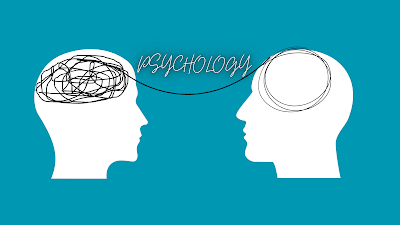INTRODUCTION:
Psychology is the study of both human and non-human behavior and the mind. Studying both unconscious and conscious processes, such as thoughts and feelings, is part of psychology. The borders between the natural and social sciences are crossed by this academic field of study, which has a huge scope.
How ideas and emotions are created, why people behave the way they do, and how many elements like heredity, environment, culture, and personal experiences affect human behavior are all difficulties that the study of psychology is designed to explain.
TYPES OF PSYCHOLOGY:
There are several branches and fields of research in psychology, including the following:
1.Clinical Psychology:- It is concerned with identifying and treating emotional and mental health problems.
2.Cognitive Psychology:- It examines how the mind works, including perception, memory, thought, and problem-solving.
3.Social Psychology:- It investigates how the presence and behavior of others affect people's ideas, feelings, and behaviors.
4.Behavioral Psychology:- Human actions and how they are taught and changed through feedback and conditioning are the focus of behavioral psychology.
5.Educational Psychology:- Learning methods, assessment of learning, and teaching methods are the main areas of focus in educational psychology.
6.Health Psychology:- It investigates how behavior affects one's physical condition and the mental components which impact health, wellness, and sickness.
These are only a few cases of all of the subfields that together make up psychology. Psychology requires to improve our awareness of human behavior, improve mental health, and work toward improvement of both people and society at large.
PSYCHOLOGY FACTS ABOUT HUMAN BEHAVIOUR:-
Certainly, here are some interesting psychology facts about human behavior:
1.Emotional contagion: Feelings can spread. It generally happens unconsciously, but being around someone who is joyful or stressed out could affect your own attitude.
2.The Zeigarnik Effect: People prefer to remember jobs that are stopped or left unfinished better than those that are finished. This could make you feel like you have "unfinished business."
3.The Hawthorne Effect: When people are aware that they are being watched, they frequently change their behavior, usually behaving better or differently than they would in a common, unobserved situation.
4.Reciprocity: According to the concept of reciprocity, when someone helps us, we sometimes feel compelled to repay the favor. This is a fundamental aspect of human social interaction.
5.Cognitive Load: We have a limited amount of brain processing power. When we are given too much information at once, it might be difficult for us to make decisions and solve problems.
6.Loss Aversion: It refers to the tendency for people to experience loss more painfully than achieving a similar gain. In behavioral economics, this is an important idea.
7.Self-Serving Bias: People usually credit their own abilities and efforts for their succeeds while placing the blame for their failures on outside forces.
8.Social loafing: People usually put up less effort when working in groups than when working alone. We call this behavior "social loafing."
9.False Consensus Effect: People usually estimate how much other people agree with their own opinions and actions.
10.In-Group Bias: People usually favor and respect others from their own group (the "in-group") preferentially to those from other groups (the "out-group").
These psychological data show the biases and differences established in human behavior. They draw attention to how our behaviors and decisions are influenced by a complex interaction of mental, emotional, and social elements.
 |
CONCLUSION:
Understanding these psychological facts can be useful in many aspects of life, from improving relationships and well-being to better communication and decision-making. They serve as a reminder that, given the fact that human behavior is frequently unpredictable and influenced by a variety of variables, it is also subject to a number of patterns and tendencies that may be examined and comprehended through scientific investigation. In the end, psychology helps in our search for self-awareness and a deeper understanding of other people by providing important insights into how the human mind functions.
.png)
.png)